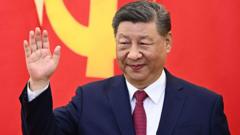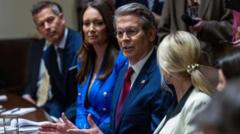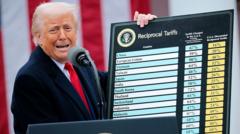As US-Canada relations face unprecedented challenges, particularly over the disputed Grey Zone, questions arise about President Trump's intentions regarding Canadian sovereignty and resources.**
The Looming Lobster Wars: Trump's Hidden Agenda with Canada**

The Looming Lobster Wars: Trump's Hidden Agenda with Canada**
Analysis of the renewed tensions between the US and Canada over the disputed Grey Zone and President Trump's possible aspirations.**
The waters surrounding Machias Seal Island, a minuscule fragment of land situated between Canada and the US, have ignited a longstanding dispute that has recently intensified under the rhetoric of US President Donald Trump. The "Grey Zone," as it is known, is emblematic of an unusual conflict where both nations assert ownership, particularly over lucrative lobster fisheries in the region.
The history of contention dates back to the late 1700s, increasingly complicated by an international court ruling in 1984 that granted fishing rights to both nations in the surrounding seas. Lobstermen on both sides have faced tangible dangers, with local narratives recounting injuries and violent confrontations as they navigated the heavily-trafficked waters during peak fishing seasons.
In recent developments, Trump's political strategies have caused rifts in what was once a commendable bilateral relationship. His inflammatory comments refer to Canada as a potential "51st state," which has raised alarm bells in Ottawa. Trudeau's administration finds itself grappling with the implications of such assertions—speculations suggesting a desire from the US for Canadian resources could lead to territorial ambitions.
Cutler, Maine, serves as the launchpad for many American fishermen operating in these contested waters, where tensions run high, leading to accusations of theft and regulatory violations. Responses from Canadian fishermen point to their own frustrations, claiming that in the realm of fishery regulations, American counterparts operate under more lenient conditions.
Tying these maritime disputes to a larger geopolitical narrative, Trump’s ambitions have strayed beyond simple resource acquisition; they may be indicative of a strategic pullback from a historically global posture, favoring a more insular focus on North American dominance. This perspective aligns with sentiments expressed by influential American political figures, positing a need to establish control over critical geographic areas—including the potential for annexing Canadian territories.
In this context, Trump's handling of relationships between the US and Canada raises eyebrows internationally. Observers note the dangers of escalating mistrust, especially as economic relationships weaken and public sentiment in Canada shifts to boycott American products—a trend observed as Canadians cancel travel plans, impacting tourism-driven regions.
This brewing storm over fishery rights and larger resource ideologies casts a worrying shadow over the future relations between the US and Canada. With trust eroded and historical benevolence overshadowed by territorial threats, the question lingers: what gains are contemplated by the US—territorial, resource-oriented, or otherwise—as they navigate the turbulent waters of their northern neighbor?






















